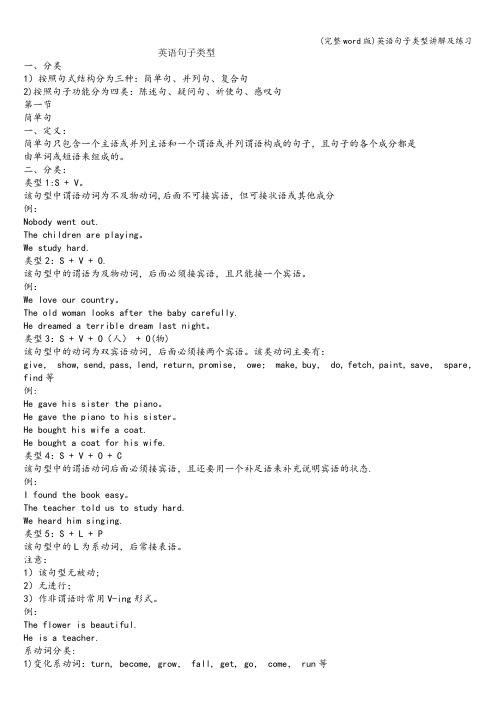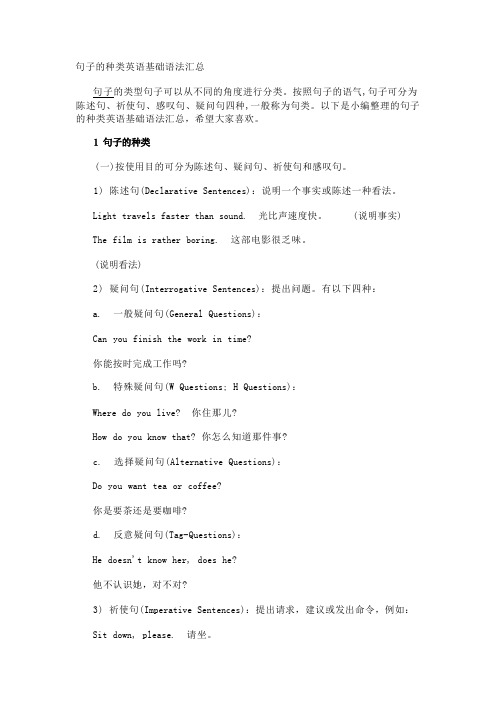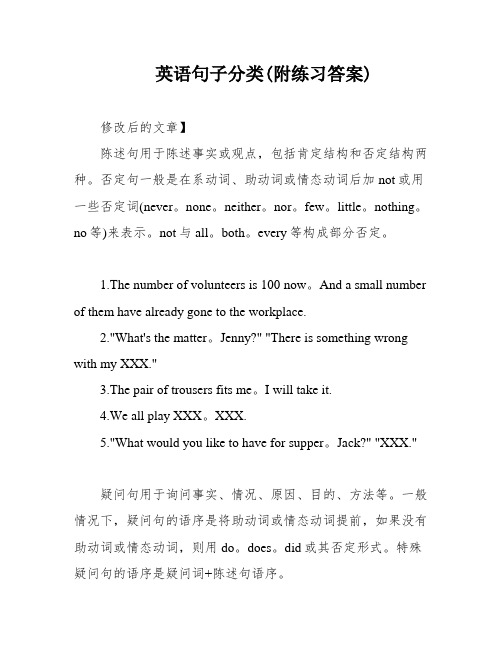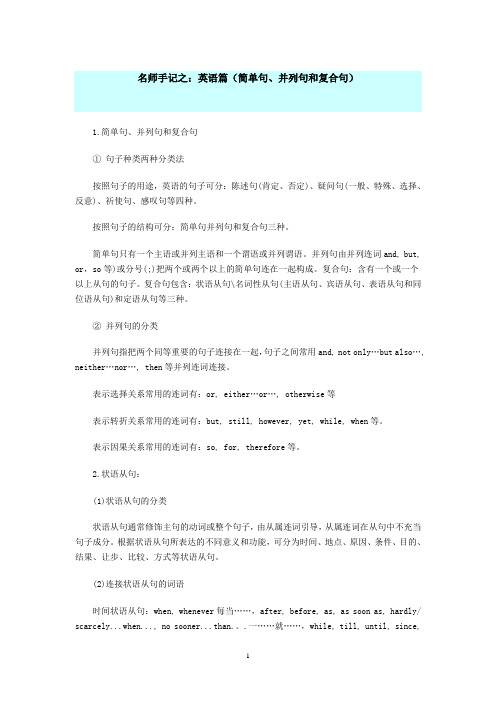英语句子分类
英语句子分类

句子分类一,主语+系动词+表语The lesson was interesting.The damage appears serious.The soup tastes delicious.The actors got ready.The milk went sour.The cinemas remained open all week.To go further was impossible.=It was impossible to go further.二,主语+谓语1, S+ Vi+ adv.A tiger has got out.A visitor came in.The noise fades away.The house has warmed up.2, S + Vi + noun./prep. PhraseThe book cost ten dollarsThe room measures 10 meters across.The meeting lasted (for) three hours.The sea front extends (for) 3 miles.3, S +Vi + to doJane hesitated to phone the office.We all longed to get away for a family holiday.三,主语+ 谓语+宾语4, S + Vt + noun./pronoun.Gorge was watching TV.The company paid a sum of money.Peter doesn’t owe anything.A small boy opened the door.5, S + Vt + O. +adv.Bill has a blue shirt on.The frost has killed the buds off.The nurse shook the medicine up.Sally is tidying her room up.6, S +Vt + that clause.The weatherman forecast that more snow is on the way. We considered that Franklin has been badly treated.7, S + Vt +wh- clause.The class doesn’t know what time it has to be in school.The students haven’t learnt which tutors they can rely on.Bill discovered who he had to give the money to.We havenot decided what we ought to do next.8, S + Vt +to doTom loved to do the household chores.Bill liked to arrive early for meetings.Mary hates to drive in the rush hour.The teacher failed to produce useful results.Jane wants to finish the job by tomorrow.Peter expected to be promoted soon.9, S + Vt + doing sth.Peter enjoys playing football.John prefers walking to the office.The airline will finish operating next year.The children started crying suddenly.四,主语+ 谓语+宾语+宾语补足语10,S + 复合Vt + O. + OC.The teacher referred the class to a passage.The waiter served Sarah with a double helping.The lecturer confused your name with mine.The visiting speakers thanked the chairman for his kind remarks. 11, S + 复合Vt + noun/pronoun +to doTony prefers his wife/her to do the work.The boss liked the staff/them to arrive early for work.Julie hates her husband/him to lose his temper.The teacher wants her class to finish the job on time.12, S + Vt + O. + doing sth.I don’t like John interrupting all the time.Jill hates her husband coming home late.Our parents dislike our working late.13,We watched the man destroying the furniture.The porter heard someone slamming the door.The children saw the cat stealing the meat.14,We watched the man destroy the furniture.The porter heard someone destroy the furniture. The children saw the cat steal the meat.15,I imagined him much taller than that.Jane prefers her coffee black.Peter has a tooth lose.The fridge keeps the beer cool.The mayor declared the meeting open.16,We made Frank chairman.We declared Jones the winner.The court considered Mr. Smiths a trustworthy man. The police didn’t accept the story as genuine.The club won’t appoint a teenager as the leader. 17,The reporter pressed her to answer the question. The thief forced Jane to hand over the money.The extra money helped John to be independent.An official declared the place to be free of infection. 18,This remark set everyone thinking.The look on Bill’s face had me trembling with fear. The policeman got the traffic moving.The driver kept his engine running.19,His tutor made him work.Mother won’t let the children play in the road. Stephen helped us organize the party.五,主语+ 谓语+双宾语20,The queen awarded the pilot a gallantry medal.The waiter poured Sarah a glass of water.Henry taught the children French. Christina will lend us her flat.I will make everyone some fresh coffee.21,The queen awarded the medal to the pilot.The waiter poured a glass of water for Sarah.Henry taught French to the children.Christina will lend the flat to us.I will make some fresh coffee for everyone.22,Colleagues told Paul that the job wouldn’t be easy.The manager informed the audience that the show had been cancelled.Police warned the driver that the roads were icy.23The employers announced to the journalists that the dispute had been settled.The consultant recommended to the employers that the salary scale should be introduced. The garage explained to the customers that the small parts had been delivered..24,A friendly guard showed the prisoner how he would escape/how to escape/.The porter reminded guest where they should leave the luggage/where to leave the luggage. Experience hasn’t taught Martha whom she can trust/ who to trust.25,We explained to the staff how they should handle complaints/ how to handle complaints. 26,We told peter to see a doctor.His teacher advised him to learn music.The court forbade the father to see his children.27,She gestured to the children to stand up.Stephen shouted to the waiter to bring another chair.A police motioned (示意) to us to move to the roadside.。
句子按语气分类

英语中的句子按【语气】来划分,可以分为:1、陈述句dec larat ive (statem ent) sentence:其交际功能主要是说明事实,肯定什么或者否定什么。
所以,可以分为(肯定陈述句、否定陈述句)Eg, You are crazy.He’s right.He did not come on time.Neverhave I been to class.2、疑问句interr ogati ve (questi on) sentence {一般疑问句、选择疑问句、特殊疑问句、反义疑问句、修辞疑问句、双重疑问句}一般疑问句:y es\no (genera l) questi on常用来形容一件事或一个情况是否属实,既可以用yes\no 来回答。
Eg,Is thereanything wrongwith the radio?Have you already been there?Wouldyou like some coffee?特殊疑问句:(specia l) wh-questi on 是对句中的某一特殊部分提出疑问,通常以wh类疑问词开头。
Eg, who is the women?When did they return home?Whichdo you like better, tea or coffee?选择疑问句:a ltern ative questi on既提出两种或以上的可能,问对方选择哪一种,供选择的部分用or连接,前升后降。
(结构可以是一般疑问句、特殊疑问句)Eg, will you go thereby bus or by train?How many pens do you have, two orthree?Is it right or wrong?反义疑问句: tag questi on 标签,附属物。
(完整word版)英语句子类型讲解及练习

英语句子类型一、分类1)按照句式结构分为三种:简单句、并列句、复合句2)按照句子功能分为四类:陈述句、疑问句、祈使句、感叹句第一节简单句一、定义:简单句只包含一个主语或并列主语和一个谓语或并列谓语构成的句子,且句子的各个成分都是由单词或短语来组成的。
二、分类:类型1:S + V。
该句型中谓语动词为不及物动词,后面不可接宾语,但可接状语或其他成分例:Nobody went out.The children are playing。
We study hard.类型2:S + V + O.该句型中的谓语为及物动词,后面必须接宾语,且只能接一个宾语。
例:We love our country。
The old woman looks after the baby carefully.He dreamed a terrible dream last night。
类型3:S + V + O(人) + O(物)该句型中的动词为双宾语动词,后面必须接两个宾语。
该类动词主要有:give, show, send, pass, lend, return, promise, owe; make, buy, do, fetch, paint, save, spare,find等例:He gave his sister the piano。
He gave the piano to his sister。
He bought his wife a coat.He bought a coat for his wife.类型4:S + V + O + C该句型中的谓语动词后面必须接宾语,且还要用一个补足语来补充说明宾语的状态.例:I found the book easy。
The teacher told us to study hard.We heard him singing.类型5:S + L + P该句型中的L为系动词,后常接表语。
句子的种类英语基础语法汇总

句子的种类英语基础语法汇总句子的类型句子可以从不同的角度进行分类。
按照句子的语气,句子可分为陈述句、祈使句、感叹句、疑问句四种,一般称为句类。
以下是小编整理的句子的种类英语基础语法汇总,希望大家喜欢。
(一)按使用目的可分为陈述句、疑问句、祈使句和感叹句。
1) 陈述句(Declarative Sentences):说明一个事实或陈述一种看法。
Light travels faster than sound. 光比声速度快。
(说明事实)The film is rather boring. 这部电影很乏味。
(说明看法)2) 疑问句(Interrogative Sentences):提出问题。
有以下四种:a. 一般疑问句(General Questions):Can you finish the work in time?你能按时完成工作吗?b. 特殊疑问句(W Questions; H Questions):Where do you live? 你住那儿?How do you know that? 你怎么知道那件事?c. 选择疑问句(Alternative Questions):Do you want tea or coffee?你是要茶还是要咖啡?d. 反意疑问句(Tag-Questions):He doesn't know her, does he?他不认识她,对不对?3) 祈使句(Imperative Sentences):提出请求,建议或发出命令,例如:Sit down, please. 请坐。
Don't be nervous! 别紧张!4) 感叹句(Exclamatory Sentences):表示说话人惊奇、喜悦、愤怒等情绪,例如:What good news it is! 多好的消息啊!(二)句子按其结构可以分为以下三类:1) 简单句(Simple Sentences):只包含一个主谓结构句子叫简单句,例如:She is fond of collecting stamps. 她喜欢集邮。
英语句子分类(附练习答案)

英语句子分类(附练习答案)修改后的文章】陈述句用于陈述事实或观点,包括肯定结构和否定结构两种。
否定句一般是在系动词、助动词或情态动词后加not或用一些否定词(never。
none。
neither。
nor。
few。
little。
nothing。
no等)来表示。
not与all。
both。
every等构成部分否定。
1.The number of volunteers is 100 now。
And a small number of them have already gone to the workplace.2."What's the matter。
Jenny?" "There is something wrong with my XXX."3.The pair of trousers fits me。
I will take it.4.We all play XXX。
XXX.5."What would you like to have for supper。
Jack?" "XXX."疑问句用于询问事实、情况、原因、目的、方法等。
一般情况下,疑问句的语序是将助动词或情态动词提前,如果没有助动词或情态动词,则用do。
does。
did或其否定形式。
特殊疑问句的语序是疑问词+陈述句语序。
1."Is the girl in red your friend?" "No。
she is learning Chinese now."2."When will the match een HAS and BIG be held?" "In our school stadium."3.How often do you volunteer in the Old People's Home。
小学英语句子的形式分类

小学英语句子的形式分类1、肯定句:是指用肯定的语气来陈述的句子,如:I’m a student.She is a doctor. He works in a hospital.There are four fans in our classroom.I’m going to buy a comic book tonight. He will eat lunch at 12:00.I’m reading a book.They are swimming.I watched TV yesterday evening.2、否定句:含有否定词或表示否定意义词的句子,如:I’m not a student.She is not (isn’t) a doctor.He does not (doesn’t) work in a hospital.There are not four fans in our classroom.I’m not going to buy a comic book tonight.He will not (won’t) eat lunch at 12:00.I’m not reading a book.They are not (aren’t) swimming.I did not (didn’t) watch TV yesterday evening.☆注意☆小结:否定句主要是在肯定句的基础上加上了否定词“not”。
有动词be的句子则“not”加在be后面,可缩写成“isn’t,aren’t”,但am not 一般都分开写。
没有动词be的句子则要先在主要动词的前面加上一个助动词(do,does,did),然后在它后面加上“not”,你也可以把它们缩写在一起如“don’t , doesn’t , didn’t )。
这三个助动词要根据人称和时态来选择,其中“does”只用于一般现在时主语是第三人称单数的情况,而“did”只用于一般过去时,不论主语是什么人称和数,都用“did” 。
英语简单句、并列句、复合句

名师手记之:英语篇(简单句、并列句和复合句)1.简单句、并列句和复合句① 句子种类两种分类法按照句子的用途,英语的句子可分:陈述句(肯定、否定)、疑问句(一般、特殊、选择、反意)、祈使句、感叹句等四种。
按照句子的结构可分:简单句并列句和复合句三种。
简单句只有一个主语或并列主语和一个谓语或并列谓语。
并列句由并列连词and, but, or,so等)或分号(;)把两个或两个以上的简单句连在一起构成。
复合句:含有一个或一个以上从句的句子。
复合句包含:状语从句\名词性从句(主语从句、宾语从句、表语从句和同位语从句)和定语从句等三种。
② 并列句的分类并列句指把两个同等重要的句子连接在一起,句子之间常用and, not only…but also…, neither…nor…, then等并列连词连接。
表示选择关系常用的连词有:or, either…or…, otherwise等表示转折关系常用的连词有:but, still, however, yet, while, when等。
表示因果关系常用的连词有:so, for, therefore等。
2.状语从句:(1)状语从句的分类状语从句通常修饰主句的动词或整个句子,由从属连词引导,从属连词在从句中不充当句子成分。
根据状语从句所表达的不同意义和功能,可分为时间、地点、原因、条件、目的、结果、让步、比较、方式等状语从句。
(2)连接状语从句的词语时间状语从句:when, whenever每当……,after, before, as, as soon as, hardly/ scarcely...when..., no sooner...than.。
.一……就……,while, till, until, since,once。
名词词组the first time第一次,last time最后一次,every/each time每次,the next time下次,the next day第二天, the moment, the minute, the second, the instant 一……就……;副词immediately, instantly, directly等也可作连词使用。
英语语法句子种类与类型

英语语法句子种类与类型
英语语法中的句子种类主要有以下几种:
1. 陈述句(declarative sentence):用于陈述一个事实、观点、
情况等,以陈述句调子末尾的句点表示。
例:She is studying English.
2. 疑问句(interrogative sentence):用于提出问题,以问号结尾。
例:Is she studying English?
3. 命令句(imperative sentence):用于表达命令或请求,常以动
词原形开头。
例:Please study for your test.
4. 感叹句(exclamatory sentence):用于表达强烈的感情或感叹,以感叹号结尾。
例:What a beautiful sunset!
此外,还有一些特殊类型的句子,如:
1. 条件句(conditional sentence):用于表达假设、条件等情况,包括主从句结构。
例:If it rains, we will stay at home.
例:I like to read books, and my brother likes to watch movies.
3. 从句(subordinate clause):作为主句的一部分,常用连接词引导,包括定语从句、名词性从句和状语从句等。
例:The book that I bought yesterday is very interesting.。
- 1、下载文档前请自行甄别文档内容的完整性,平台不提供额外的编辑、内容补充、找答案等附加服务。
- 2、"仅部分预览"的文档,不可在线预览部分如存在完整性等问题,可反馈申请退款(可完整预览的文档不适用该条件!)。
- 3、如文档侵犯您的权益,请联系客服反馈,我们会尽快为您处理(人工客服工作时间:9:00-18:30)。
否定陈述句
• • • • • • • 1)使用not否定 He is not a worker. She does not do the cleaning every day. I have not had my breakfast yet. 2)使用not以外的否定词表示否定。 I have no money. We have no time to do it.
5)nothing=not any thing什么都没有
• I have nothing to wash today. • He had nothing to eat that day.
6)none of 没有任何人/没有任何事物
•It's none of your business. •None of us is going to see the film.
•一般疑问句有时也以否定形式出现,用 以表示赞赏、责备等带有感情色彩的意 思或者表示 提出看法、意见和建议等
• • • • • Didn't I tell you how to do it? 难道我没告诉你应该怎么做吗? Won't you come to my birthday party? 你难道不会来参加我的生日晚会吗? Don't you believe she will get married to that old man? • 你难道不相信她会嫁给那个老头?
必背:记住下面肯定和否定的形式
• • • • • • all--none,no everyone,each--no one some--not any,no everything--nothing a few--few a little--little
注意:以think,believe为主句谓语的复合 句,其从句的否定要前移至主句的谓语 上。
英语句子分类
按照用途分为四类:
• • • • 陈述句 疑问句 祈使句 感叹句
句子定义
陈述句
• • • • 陈述句用来陈述事实或者表明看法。 His name is Li Ming. I feel happy. Linda has long,red hair.
疑问句
• 疑问句用来提出疑问,可分为四类:一般 疑问据句(能用Yes/No回答),特殊疑问 句(不能用Yes/No回答),选择疑问句, 反意疑问句。 • Is this your ruler? • How are you ? • Is he a teacher or a cook? • You agree with him,don't you?
细说句型
陈述句
• • • • • • • • • • • • 肯定陈述句 a) This is a book. (be动词) b) He looks very young. (连系动词) c) I want a sweat like this. (实义动词) d) I can bring some things to school. (情态动词) e) There’s a computer on my desk. (There be结构) 否定陈述句 a) These aren’t their books. b) They don’t look nice. c) Kate doesn’t go to No. 4 Middle School. d) Kate can’t find her doll. e) There isn’t a cat here. (=There’s no cat h在句首,读 时用升调,回答要以yes/no开始,也可以看 情况灵活回答。 • --Do you work in that lawyer's office? • --No, I don't work there. • --你是在那家律师事务所上班吗? • --不,我不在那儿上班 • --Can you wait here for me for a moment? --Certainly.
• I don't think you are hungry. • We don;t believe she will come.
• there be 句型
• 此句型在英语中表示“什么地方或什么时 间存在什么事物”。在这种结构中,there 是引导词,be后面的名词是主语,句子的 结尾是地点(时间)状语。 • There is a tall tall tree in front of the classroom. • There will be a meeting at the conference room at 8 o'clock tomorrow morning.
•如果有两个或两个以上的主语,谓语动 词be要采用就近一致的原则
• There is a pen,two books,and many pencils on the desk.
•there be 结构有不同的时态形式,而且可 以和各种助动词,情态动词连用.
•There was a meeting in our school yeaterday. •There will be a new film show on Sunday. •There can't be any mistakes in his passage.
祈使句
• 用于表达命令,请求,劝告,警告,禁止 等的句子叫做祈使句,祈使句常用于表达 命令,因此称为命令句。 • Watch the movie and find out! • Be quiet,please.
感叹句
• 感叹句表示说话时的惊异,喜悦,气愤等 情绪,句末常用感叹号,读时一般用降调。 • What a beautiful girl! • How happy(they are)! • What an interesting book!
3)用never表示否定,与其比not要强烈。
• She never foget him. • I will never foget to do it.
4)few和little分别表示可数名词和不可数名 词的否定,含义为“几乎没有”。 • Jack has few friends here. • There is little water in the bottle.
